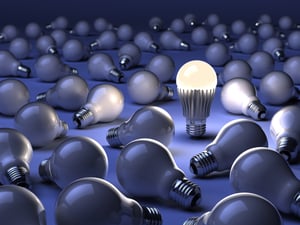 LED lighting technology has been available for many years. However, compared to incandescent light bulbs the price tag was originally significantly higher making them not a viable option for many. With improved manufacturing techniques, LED pricing has come down making them a more popular choice for consumers. In addition, expanded color options allow for simple house decorations for the many holidays we celebrate.
LED lighting technology has been available for many years. However, compared to incandescent light bulbs the price tag was originally significantly higher making them not a viable option for many. With improved manufacturing techniques, LED pricing has come down making them a more popular choice for consumers. In addition, expanded color options allow for simple house decorations for the many holidays we celebrate.
Some of the benefits of LED bulbs include:
- Brighter than incandescent bulbs
- Increased energy efficiency
- Reduced wattage used
- Less heat created
- Longer lasting (thousands of hours) than other bulbs
- Great outdoor lighting
- Improved safety
- Easy to change to
Changing to LED lights in your home is easy and safe. Where LED lights can be dangerous is if you’re switching from fluorescent tube lights to LED tube lights in your ”man cave,” “she shed,” or garage.
Claim Scenario
You’re getting ready to host a big Superbowl party in your garage. After years of waiting, your team has finally made it to the Superbowl. This party is going to be like none other. Lots of family and friends will be attending and there will be plenty of food and beverages to satisfy everyone’s palate. A big win may even bring out some fireworks.
Because you spend a lot of time in your garage, it’s been updated, making it a great place to hold a party. The floors have been epoxied and are shiny and clean. All the studs have been covered with insulation and drywall painted in your favorite team’s colors. Because you live in a cold climate, you have a nice heater that keeps your garage at a comfortable, consistent temperature. And a nice 50” inch TV is already hung.
The only thing you have left to do is update your fluorescent tube lights to LED tube lights. Which is no big deal, right? You drive to your local hardware store and select the LED bulbs. When you arrive home, you install them, and you’re set. You decide to leave them on for several hours because you want to admire your garage and pat yourself on the back for a job well done.
Several hours go by and suddenly you smell smoke. You frantically run to your garage and the entire thing is engulfed in flames. You can’t believe it. You quickly call 911 to report the fire. The firefighters responded quickly and save your house from damage. However, your garage is a total loss. While home insurance provides coverage for fire loss, it’s an unfortunate situation.
After an inspection, you learn that the fire resulted from the improper installation of the LED bulbs.
Converting fluorescent tube lights to LED
As mentioned above, LED bulbs have many benefits and are very safe. What went wrong in the scenario above is that you switched fluorescent tube lights to LED tube lights. Unfortunately, converting to LED tube lights is a bit more complicated because the two technologies are different.
To properly convert your garage to LED lighting you can do several things.
- Buy new light fixtures and LED tube lights, which are more expensive.
- Keep your existing fixtures and rewire them to bypass the ballast.
- Call an electrician.
Click here to learn more about how to make the conversion in your garage, “man cave,” or “she shed.”
Do you have any tips or information you’d like to share? I’d love to hear them; please share them in the box below.
Sources:
https://www.decorativelightcovers.com/why-led-lighting-has-become-so-popular/
https://ledlightguides.com/convert-fluorescent-to-led-lights/
https://www.stouchlighting.com/blog/top-15-advantages-of-led-lighting
This article is intended for general educational and illustrative purposes only and should not be construed to communicate legal or professional advice. Further, this article is not an offer to sell insurance. Please consult with your licensed insurance agent for specific coverage details and your insurance eligibility. All policies are subject to the terms, conditions, limitations, definitions, and exclusions contained therein.





